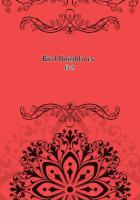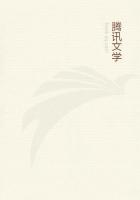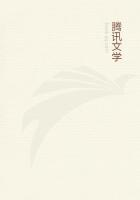And how to answer that last question was the abysmal problem of the whole of Neoplatonic philosophy, in searching for which it wearied itself out, generation after generation, till tired equally of seeking and of speaking, it fairly lay down and died. In proportion as it refused to acknowledge a common divine nature with the degraded mass, it deserted its first healthy instinct, which told it that the spiritual world is identical with the moral world, with right, love, justice; it tried to find new definitions for the spiritual; it conceived it to be identical with the intellectual. That did not satisfy its heart. It had to repeople the spiritual world, which it had emptied of its proper denizens, with ghosts; to reinvent the old daemonologies and polytheisms--from thence to descend into lower depths, of which we will speak hereafter.
But in the meanwhile we must look at another quarrel which arose between the two twin schools of Alexandria. The Neoplatonists said that there is a divine element in man. The Christian philosophers assented fervently, and raised the old disagreeable question: "Is it in every man? In the publicans and harlots as well as in the philosophers? We say that it is." And there again the Neoplatonist finds it over hard to assent to a doctrine, equally contrary to outward appearance, and galling to Pharisaic pride; and enters into a hundred honest self-puzzles and self-contradictions, which seem to justify him at last in saying, No. It is in the philosopher, who is ready by nature, as Plotinus has it, and as it were furnished with wings, and not needing to sever himself from matter like the rest, but disposed already to ascend to that which is above. And in a degree too, it is in the "lover," who, according to Plotinus, has a certain innate recollection of beauty, and hovers round it, and desires it, wherever he sees it. Him you may raise to the apprehension of the one incorporeal Beauty, by teaching him to separate beauty from the various objects in which it appears scattered and divided. And it is even in the third class, the lowest of whom there is hope, namely, the musical man, capable of being passively affected by beauty, without having any active appetite for it; the sentimentalist, in short, as we should call him nowadays.
But for the herd, Plotinus cannot say that there is anything divine in them. And thus it gradually comes out in all Neoplatonist writings which I have yet examined, that the Divine only exists in a man, in proportion as he is conscious of its existence in him. From which spring two conceptions of the Divine in man. First, is it a part of him, if it is dependent for its existence on his consciousness of it?
Or is it, as Philo, Plutarch, Marcus Aurelius would have held, as the Christians held, something independent of him, without him, a Logos or Word speaking to his reason and conscience? With this question Plotinus grapples, earnestly, shrewdly, fairly. If you wish to see how he does it, you should read the fourth and fifth books of the sixth Ennead, especially if you be lucky enough to light on a copy of that rare book, Taylor's faithful though crabbed translation.
Not that the result of his search is altogether satisfactory. He enters into subtle and severe disquisitions concerning soul. Whether it is one or many. How it can be both one and many. He has the strongest perception that, to use the noble saying of the Germans, "Time and Space are no gods." He sees clearly that the soul, and the whole unseen world of truly existing being, is independent of time and space: and yet, after he has wrestled with the two Titans, through page after page, and apparently conquered them, they slip in again unawares into the battle-field, the moment his back is turned. He denies that the one Reason has parts--it must exist as a whole wheresoever it exists: and yet he cannot express the relation of the individual soul to it, but by saying that we are parts of it; or that each thing, down to the lowest, receives as much soul as it is capable of possessing. Ritter has worked out at length, though in a somewhat dry and lifeless way, the hundred contradictions of this kind which you meet in Plotinus; contradictions which I suspect to be inseparable from any philosophy starting from his grounds. Is he not looking for the spiritual in a region where it does not exist; in the region of logical conceptions and abstractions, which are not realities, but only, after all, symbols of our own, whereby we express to ourselves the processes of our own brain? May not his Christian contemporaries have been nearer scientific truth, as well as nearer the common sense and practical belief of mankind, in holding that that which is spiritual is personal, and can only be seen or conceived of as residing in persons; and that that which is personal is moral, and has to do, not with abstractions of the intellect, but with right and wrong, love and hate, and all which, in the common instincts of men, involves a free will, a free judgment, a free responsibility and desert?
And that, therefore, if there were a Spirit, a Daemonic Element, an universal Reason, a Logos, a Divine Element, closely connected with man, that one Reason, that one Divine Element, must be a person also? At least, so strong was the instinct of even the Heathen schools in this direction, that the followers of Plotinus had to fill up the void which yawned between man and the invisible things after which he yearned, by reviving the whole old Pagan Polytheism, and adding to it a Daemonology borrowed partly from the Chaldees, and partly from the Jewish rabbis, which formed a descending chain of persons, downward from the highest Deities to heroes, and to the guardian angel of each man; the meed of the philosopher being, that by self-culture and self-restraint he could rise above the tutelage of some lower and more earthly daemon, and become the pupil of a God, and finally a God himself.















